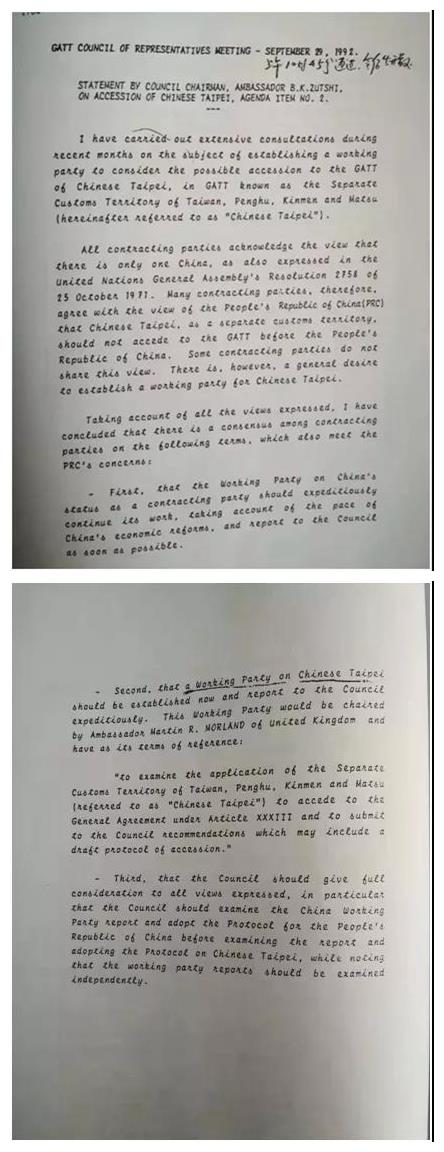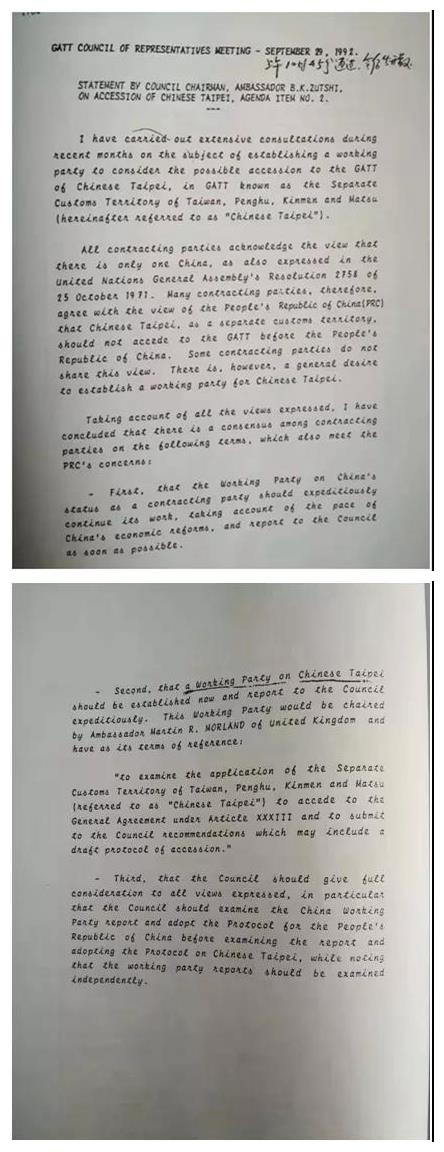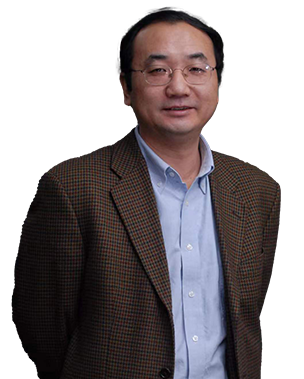Years pass by, and old events unfold (Series 8)
During the more than a year of "demining" by the two kings of the Chinese delegation, the work of the China Working Group has made little progress. Obviously, the entry of both sides of the Taiwan Strait into the General Agreement on Tariffs and Trade is actually bound together. Without resolving the Taiwan issue, China's negotiations will be difficult to proceed. However, the main contracting parties in the West, led by the United States, the Secretariat of the General Agreement, and the Chairman of the China Working Group, Gillard, are also very clear about a political red line, that is, the Taiwan issue cannot be bypassed by China and cannot be negotiated with the Chinese government. Without the consent of the Chinese government, the Taiwan issue is exempt from negotiations.
In May 1991, Director General Dunkel visited China, and the leaders of the Chinese government stated their position to him: Taiwan is part of China's territory. After China resumes its status as a contracting party, Taiwan can join the General Agreement as a separate customs territory. This has pointed the way and created conditions for a negotiated settlement of the Taiwan issue.
But before the terms are negotiated, the United States is ready to act. Just after New Year's Day in 1992, the United States threatened to promote the establishment of a Taiwan Working Group at the General Agreement Council in February to launch negotiations on Taiwan's accession to the General Agreement. This is undoubtedly a heavy mine. This year, it was the turn of Indian Ambassador to the General Agreement on Tariffs and Trade, Zhu Qi, to serve as the chairman of the Council. The old and young kings immediately knocked on the door of the Indian mission and approached Ambassador Juqi to negotiate.
In the face of Zhu Qi, Lao Wang reiterated, word for word, that I should translate the three principles on China's accession to the General Agreement with Taiwan word for word: First, the Government of the People's Republic of China is the only legitimate government representing all of China; Secondly, the issue of restoring China's status as a contracting party to the General Agreement on Tariffs and Trade must be resolved first, before it is possible to consider Taiwan's accession to the General Agreement on Tariffs and Trade; Third, if Taiwan wants to participate in the GATT as a separate customs territory, it must consult with the Chinese central government and obtain consent. In short, these three principles are: one China, China first Taiwan, and China agrees.
Juki is one of those pampered Indians with a perfectly white brown face that always feels slightly puffy. He was not tall, slightly overweight, buried in the sofa, as if listening carefully. Behind the lens was a pair of shallow smiling eyes, but they could not conceal their cunning. After listening, he responded in strong Indian English, noting China's three principles. As President of the Council, he is at the behest of the contracting parties, for which he will exchange views informally with each contracting party.
At the same time, the newly appointed second Chinese negotiator, Vice Minister Tong Zhiguang of the Ministry of Foreign Trade and Economic Cooperation, started what he called an "ice breaking trip" to Geneva to participate in the China Working Group meeting. At the meeting, Deputy Director General of the General Agreement, American Carlyle, expressed to Minister Tong his willingness to mediate between China and the United States in his personal capacity and proposed that the President of the Council make a statement clarifying the conditions for Taiwan's accession to the General Agreement. Card and took out the first draft of the statement. However, the first draft is far from China's position on how to implement China's three principles, especially China's priority over Taiwan and Taiwan's appellation in the General Agreement.
It seems that this is another protracted negotiation, but it cannot be postponed for a long time. The Chinese Mission in Geneva, together with the United States Mission in the General Agreement on Tariffs and Trade (GATT), the European Union Mission in the General Agreement on Tariffs and Trade (EU Mission in GATT), and representatives of the three parties in Geneva, were instructed to conduct intensive informal consultations around the clock on the specific text of the Council's presidential statement.
The Chinese team will be composed of two young and old Wangs. Lao Wang will negotiate and I will translate. The American side presented a commissioner named Tang Weili in Chinese, while the European Union presented a counselor named Carl Falkenberg. Tang Weili is a diplomat in a wheelchair. A few years ago, he worked in the U.S. Embassy in China. He met us and then transferred to the U.S. Embassy in Geneva. It is said that he once negotiated with the United States legislature to force the United States to modify the rule that disabled people cannot be diplomats. There are several steps in front of the GATT gate, and it is not possible to reconstruct a disabled lane. After Tang arrived, the General Agreement Secretariat installed a simple elevator on the side of the steps for his use. Falkenberg, who is known by name as a German, was a strong and energetic person who loved football and skiing. He seemed to be careless, but he worked with agility and rigor. At that time, the two Germans had just reunited after more than 40 years of division, and the capital was being relocated back to Berlin. Falkenberg originally belonged to the kind of German with a smile on his face, and the reunification of the country made him proud and cheerful. At this moment, the German who has just reunited his country is discussing the Taiwan issue with China. It really has a different taste for him and me.
The trilateral consultations between China, the United States, and Europe took into account Tang Weili, and most of them were held in the United States Mission and the GATT Building (the United States Mission is only a hundred meters from the GATT Building); Due to courtesy, there have been several consultations with the Chinese Embassy. Negotiations are open-ended and available on call as soon as needed. From January to September 1992, the four parties spent eight months negotiating a presidential statement of over 500 words on the General Agreement Council. Word for word, word for word. Several of the degree adverbs and quantity adverbs were discussed back and forth for several months. The English text of the negotiated statement shall prevail (the official language of the General Agreement). The statement is shown in both Chinese and English.

President's statement of the General Agreement Council

Chinese translation of the statement by the President of the General Agreement Council
The above statement, which was negotiated by the three parties, was then submitted to the President of the Council, Ambassador Juchi of India, and became the "Juchi text". He read it out at the General Agreement on Tariffs and Trade (GATT) Council on September 29, 1992, and ultimately became a decision of the Council. After reading out, Zhu Qi made an additional oral explanation:
"As part of the understanding forming the decision just made by the Council, Chinese Taipei's representation in the GATT during its tenure as an observer and subsequently as a contracting party will follow the representation model of Hong Kong and Macao. In other words, the title of its representative must not have any sovereign meaning.".
"On behalf of the Council, I would also like to invite Taipei, China, to participate as an observer in future meetings of the Council and other GATT bodies during the work of the Working Group. Of course, the Secretariat will also request the authorities of Taipei, China to submit the necessary information and documents to facilitate the deliberations of the Working Group."
The above statements and additional notes have been recorded in the documents of the General Agreement on Tariffs and Trade (GATT) Council and become binding legal documents for the contracting parties.
Five hundred words, writing for eight months. One of the best things in life is to chew words and write slowly.
To be continued
(This article is translated by software translator for reference only.)
Related recommendations
- Tax lawyers review the draft of the revised Tax Collection and Administration Law for soliciting opinions
- New Measures for Punishing "Dishonesty" by the Supreme People's Court at the Two Sessions in 2025 (Part 3): "Height Limit" Single Release Mechanism
- New Measures for Punishing "Dishonesty" by the Supreme People's Court at the Two Sessions in 2025 (Part 2): Grace Period System
- Interpretation of the Management Measures for Compliance Audit of Personal Information Protection - Feeling the Rhythm and Rhythm of Regulatory Flow



